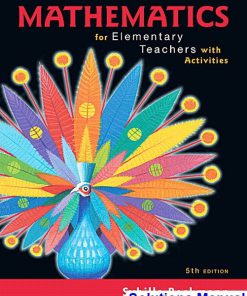Test Bank for Behavior Management Positive Applications for Teachers 7th by Zirpoli
$35.00 Original price was: $35.00.$26.50Current price is: $26.50.
Test Bank for Behavior Management Positive Applications for Teachers 7th by Zirpoli
Instant download Test Bank for Behavior Management Positive Applications for Teachers 7th by Zirpoli pdf docx epub after payment.

Product details:
- ISBN-10 : 0133918130
- ISBN-13 : 978-0133918137
- Author: Thomas J. Zirpoli
Here are numerous school-wide and individual strategies for measuring, assessment, and dealing effectively with behavior challenges in today’s regular and special education classrooms. Ideal for classroom management or behavior management courses with an emphasis on school-based environments, Zirpoli’s Behavior Management is research based while focusing on the practical aspects of the behavior challenges educators commonly face. Included are functional applications and examples, including Classroom Connections and reflections on these connections; discussion questions; a number of embedded, meaningful examples for teachers and other caregivers; and related Internet links. The Enhanced Pearson eText features embedded video.
Table Of Contents:
- Part One Foundations for Understanding and Managing Behavior
- Chapter 1 Basic Concepts of Behavior and Behavior Management
- Chapter Outcomes
- Historical Foundations for Understanding Behavior and Behavior Analysis
- Classical Conditioning
- Ivan P. Pavlov: The Father of Classical Conditioning
- John B. Watson: The Father of Behaviorism
- Operant Conditioning
- What Happens prior to the Behavior?
- What Happens after the Behavior?
- Edward L. Thorndike: The Laws of Behavior
- Burrus Frederic Skinner: The Father of Operant Conditioning
- The Behavioral versus Psychoanalytic Approach
- Social Learning Theory
- Albert Bandura: The Father of Social Learning Theory
- Behavior Therapy
- Systematic Desensitization
- Modeling
- Biofeedback
- Applied Behavior Analysis
- Ivar Lovass: The Father of Applied Behavior Analysis
- Basic Concepts of Behavior and Behavior Management
- Behavior
- Responses
- Stimuli
- Antecedents
- Consequences
- Reinforcement
- Punishment
- Prompts and Cues
- Natural Prompts
- Verbal Prompts
- Gestural Prompts
- Modeling Prompts
- Physical Prompts
- Basic Assumptions about Behavior and Behavior Management
- Assumption 1: Most Behaviors Are Learned
- Assumption 2: Most Behaviors Are Stimulus-Specific
- Assumption 3: Most Behaviors Can Be Taught, Modified, and Changed
- Assumption 4: Behavior Change Goals Should Be Specific and Clearly Defined
- Assumption 5: Behavior Change Programs Should Be Individualized
- Assumption 6: Behavior Change Programs Should Focus on the Here and Now
- Assumption 7: Behavior Change Programs Should Focus on the Child’s Environment
- Assumption 8: Behavior Change Programs Should Focus on Reinforcement Strategies and Other Positive Behavior Supports
- Myths and Misconceptions about Behavior and Behavior Management
- Myth 1: Changing Another Person’s Behavior Is Coercive
- Myth 2: The Use of Reinforcement to Change Behavior Is a Form of Bribery
- Myth 3: Students Will Learn to Behave Appropriately Only for Reinforcement
- Myth 4: Students Should “Work” for Intrinsic Reinforcers
- Myth 5: All Students Should Be Treated in the Same Way
- Summary
…
People also search:
behavior management positive applications for teachers 7th
behavior management positive applications for teachers
behavior management positive applications for teachers pdf
behavior management positive applications for teachers 7th ebook
positive behavior management in the classroom
You may also like…
Test Bank
Test Bank for The Principles of Learning and Behavior Active Learning Edition 7th Edition by Domjan
Solution Manual
Solution Manual for International Management Culture Strategy and Behavior 8th Edition by Luthans
Solution Manual












